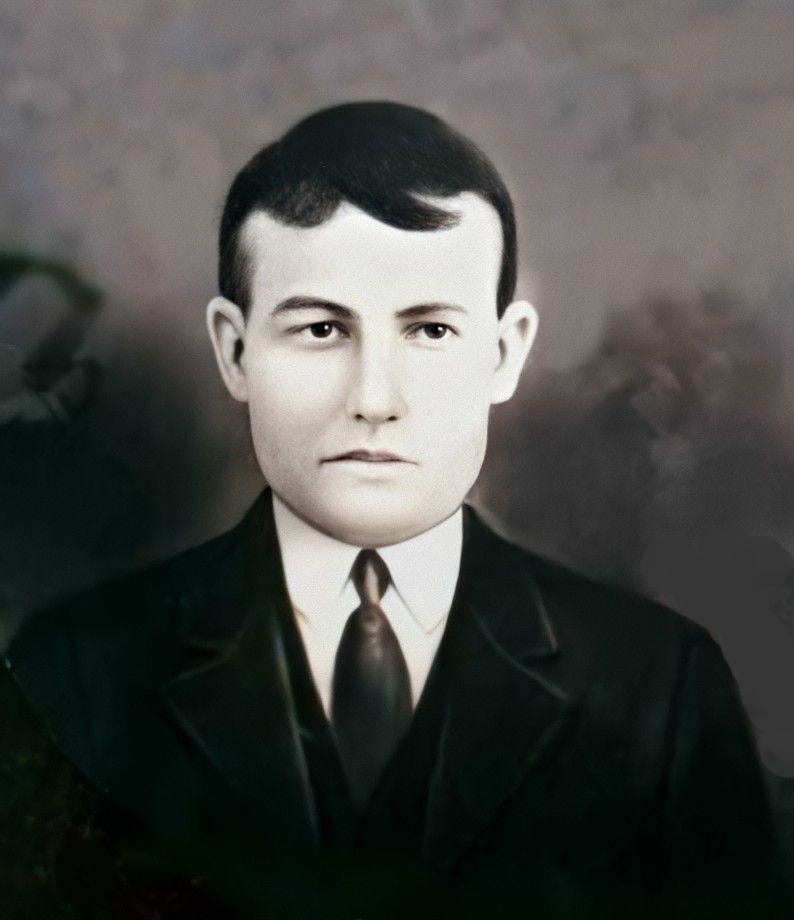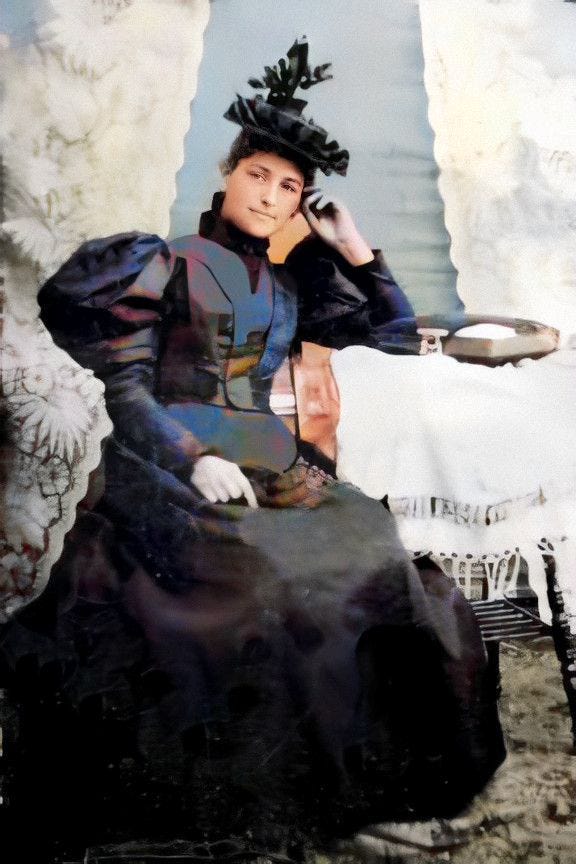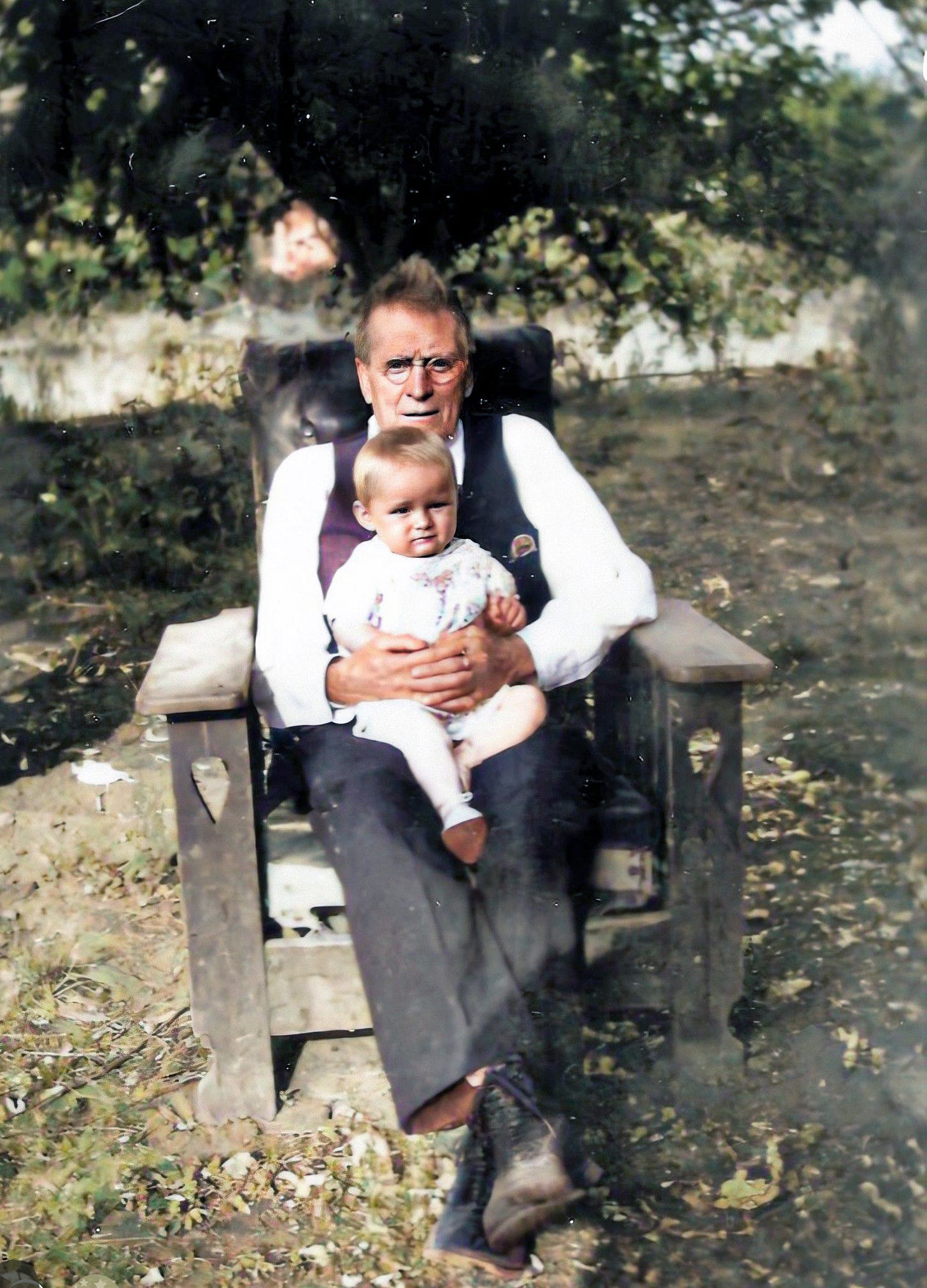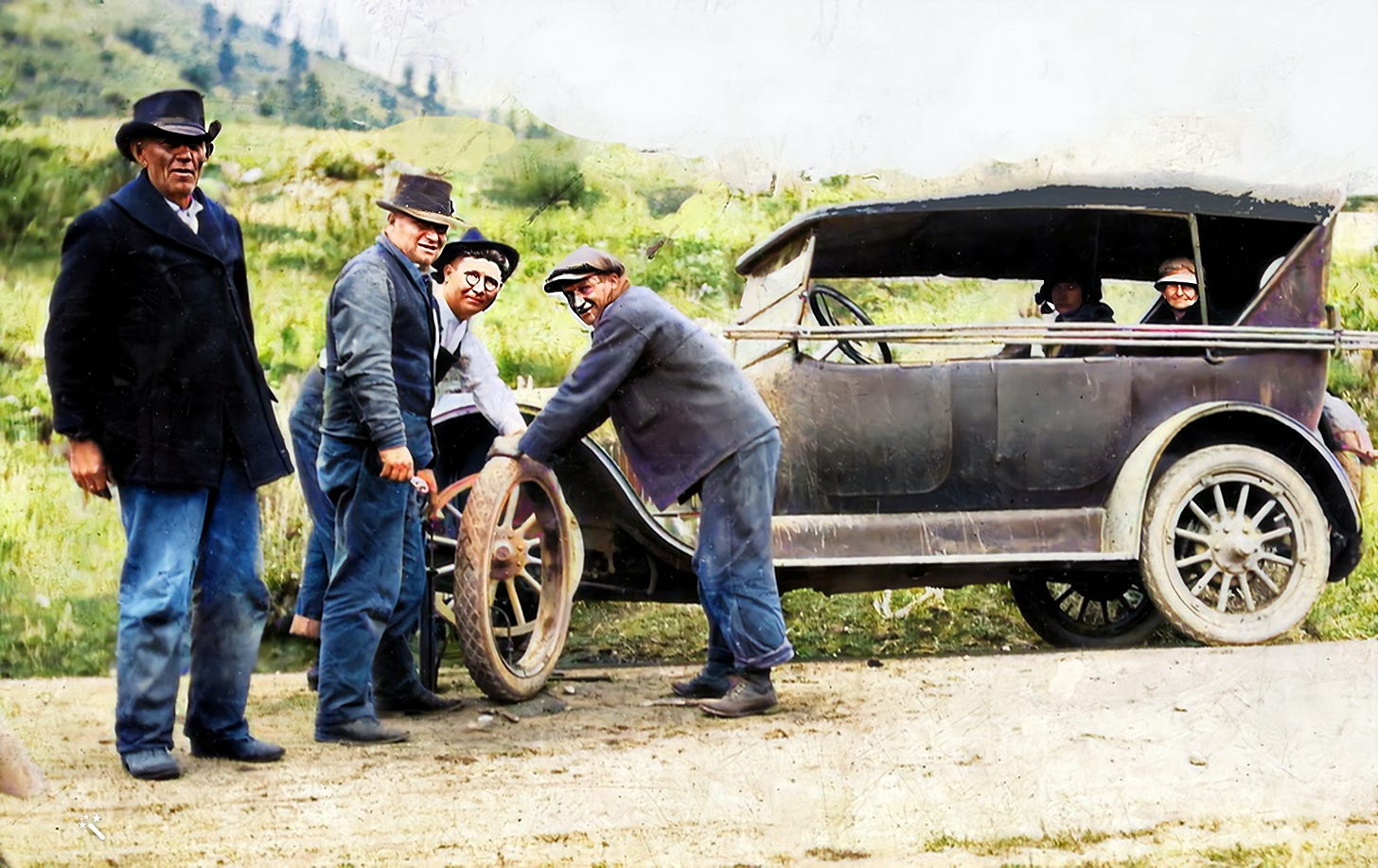This is the third time I’m writing about the tragic death of a grandfather at an early age. I wrote of the sudden death of my maternal grandfather at the age of 49 while preaching a funeral. I wrote of my maternal great-grandfather who fell from the scaffolding while painting a building in Kansas City when he was 43. Now I write the most heart-wrenching story of all. The tragic death of my paternal great-grandfather at Samuel Henson’s Sawmill in Flat Creek Missouri on Oct. 24, 1900, aged 37 years, 9 months and 1 day.
John Rosencranz Wilson was born on 23 January 1863, in Carter, Tennessee, the son of James Charles Wilson and Emiline Worley Curtis. After the family moved to Barry County, Missouri, he married Mary Jane Baze, literally the girl next door.
My cousin Delores Jean Holm Solberg gathered together information told her by her mother, Inga Wilson Holm:
Mary Jane was born in Missouri in 1864 while her father was off fighting in the Civil War with Union troops in Arkansas. She was the first child of 16, and her earliest memory was of riding horseback with her mother to Arkansas to meet her father when the war ended. When she was 16, she fell in love with John Wilson, a boy from a neighboring farm. They were married after a year-long courtship.” John was 17 and Mary Jane 16 when they married on April 8, 1880, so they moved in with her parents Abednego Baize, his wife Margaret (Hickson) and their seven children, where John worked on the Baize farm.
Continuing Delores’ account by her mother:
Dissatisfied with never being able to get ahead enough to purchase their own land, they decided to join a wagon train coming west and stake out a homestead near Waterville, Washington.
When they finally arrived at their allotted section of land, they met Louis Augst, a young man who had recently arrived there also, and was homesteading the land bordering theirs (Augst, Louis, Farmer, Section 6, Township 26, Range 24, P. O. Withrow). His main crop was wheat, dry land farming. He also had milk cows. Since he was a bachelor, he offered to help them build their cabin and drill a well first. In return, it was agreed that he would board with them till they could build his cabin. Their cabins were built near their joint property line.
Drought caused many hardships for them, as it was long before irrigation as they use now, was developed. At times the well would be so dry that the water could only be dipped a cup at a time. While Mr. Augst had enough money saved to get through hard times, the Wilsons were not as lucky. They eventually had to give up and look elsewhere for land on which they could make a living.
They left for Eastern Oregon, where another son was born, Minton Jefferson, (my grandfather). Hardships caused by drought continued there in Oregon as well, and they eventually had to sell everything and head back to Missouri—again by covered wagon. (Note – we never heard about the eastbound wagon trains!!)
The 1900 census shows that John was able to own land and a house on his return to Missouri where his eighth child was born. His obituary also said that he “professed religion during a protracted meeting held by the Missionary Baptists in August 1900, joined the church and was baptized.”
At 76 degrees, it was an unseasonably dry, hot day on October 24, 1900 as John left his wife and seven children, including baby Lola Belle, just five months old, to go to work for Samuel Henson. Henson had a sawmill set up along Flat Creek where the flat topography was ideal for setting up a sawmill.
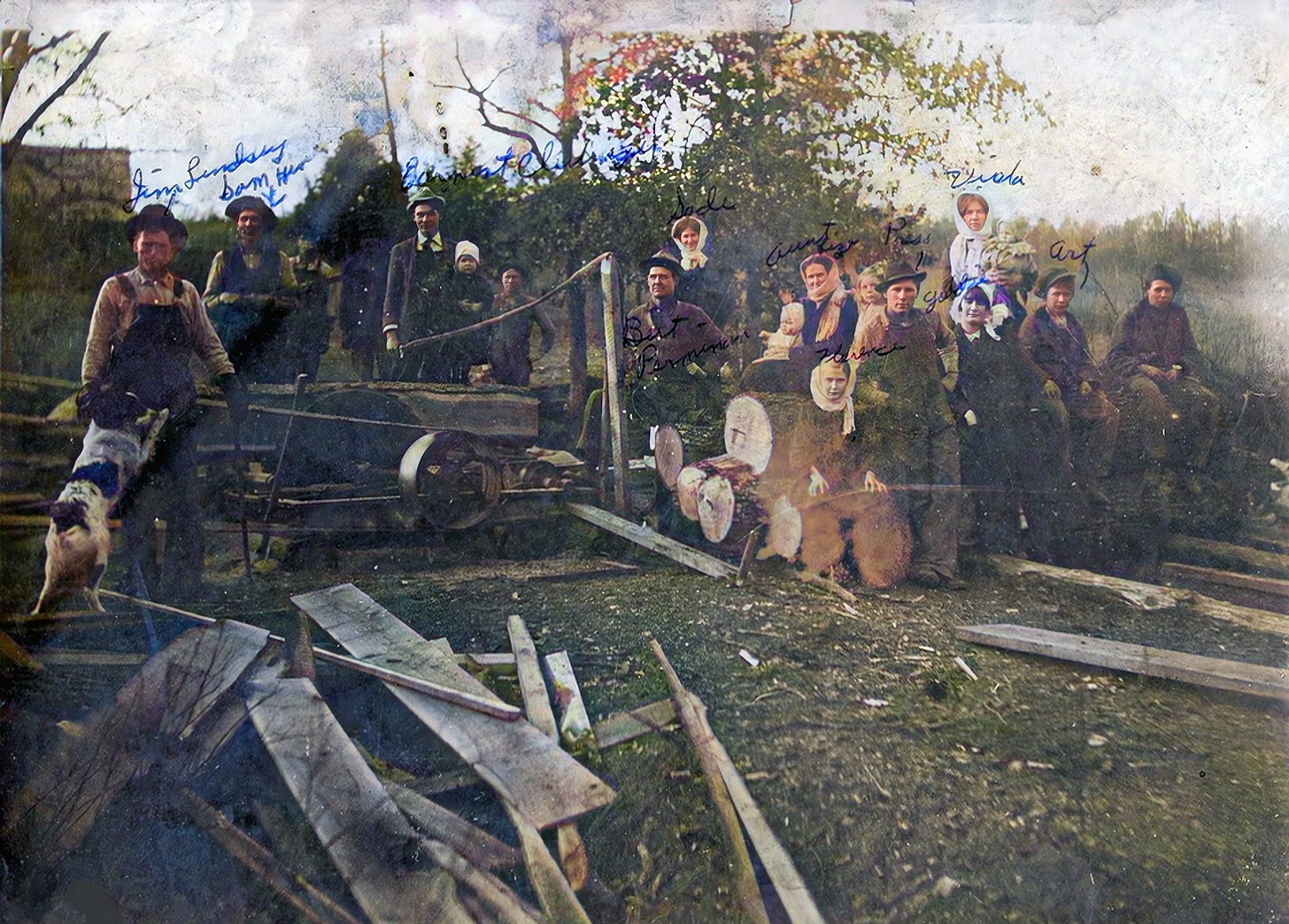
His obituary gave details of the accident:
John Wilson was killed last Wednesday at the Henson sawmill on Flat Creek. Mr. Wilson was taking lumber from the carriage when a piece struck the circle saw and threw him in front of it. Before the engine could be stopped the saw had cut him in a horrible condition. One lung was badly cut and his breast laid open. His chin was cut in twain. The injured man lived two hours after the accident and conscious to the last.
From a clipping found in the family Bible of Joseph A. and Celia Belle (Baze) Jackson:
It was a shock long to be remembered by those who witnessed the accident, and stood by him in those three weary hours of most intense suffering. Powerless to relieve in any way, but to sympathize and ask the dear Lord to give him dying grace and take him home to His own dear self, where there is no more sorrow, no more sighing, no more pain, nor suffering, neither death, and where his weary soul might be at rest. When he had undergone three hours of patient suffering the dear Lord relieved him, and we closed his weary eyes. With a peaceful smile on his face we folded his hands on his torn and bleeding breast; hands we had so often clasped in warmest friendship and laid him away to rest.
I try to imagine Mary Jane getting this news. We don’t know if she was told in time to be with him at the hour of his death, but I truly hope not. I don’t know know how a woman could get over the gruesome sight of her husband in that condition. We do know that her financial needs were immediate. A woman with seven very young children (the fifth of their eight children had died as a baby) had no way to run a farm or support her family, so she moved in with her parents who still had three children at home, making 13 of them to crowd into one farmhouse. It was not sustainable, but it didn’t have to be. Something wonderful intervened when bachelor Louis Augst reappears in the story.
During John and Mary Jane’s brief stay in Waterville, Washington, their property adjoined that of Louis Augst. In due time, the news of John’s tragic death reached Louis, who was still a bachelor. Though she was seven years his senior, he remembered the beautiful wife who worked so hard alongside her husband, kept a lovely home and had cooked delicious meals that he enjoyed when he boarded with them. To make her even more inviting, Mary Jane had five strong sons to help him work the farm. He wrote to Mary Jane immediately, proposing marriage.
Mary Jane gratefully accepted and they were married a little over a year after John’s death. They had a happy life together, having four daughters, the last one living only two years. John’s children, grandchildren and great-grandchildren loved Grandpa Augst. My cousin Delores reports her mother’s memories:
During harvest there were at least 20 extra men to cook for besides her own family, which in the next few years after their marriage, increased. Grandpa would try to get her to hire someone to help with the extra work, but she never would, and insisted she could handle it. The girls helped too.
Grandma was famous for her cooking and baking, and because of her wonderful meals, they always had the same harvest crews coming back year after year. Her biscuits, breads, cakes and pies were “out of this world”! Harvest meals consisted of three meals a day and the harvesters worked from morning till dark. Meals always included pork and beef three times a day. The beef was delivered to the ranch by wagon and later by truck, packed in ice. Once or twice a week, chicken would be on the menu and Mom would help her pluck and clean eight of them for a meal. A variety of breads, pancakes, eggs and cereal would also be served for breakfast. Dinner and supper always included cakes and pies for dessert.
The laundry was done on a washboard with soap Grandma made herself with waste pork fat and lye in a big iron kettle in the backyard. After gasoline Maytags came into fashion, Grandpa Lou proudly presented her with one.
On summer evenings Grandma (Mary Jane) and Grandpa Lou, as we kids called him, would sit in their rocking chairs, rocking side by side on the screened-in front porch that stretched the full length of the front of their big white two-story farmhouse. They would discuss crops or news of interest.
Grandma sat there, trim and neat with her long silver-streaked hair pulled back in a bun at the back of her head. Her long cotton dresses, always covered by an apron at home, reached down over her high-top shoes. (A lady never showed her shoe tops in those days!!) They always seemed so happy and content with each others’ company.
We will never know what was in the heart of Mary Jane at the loss of her beloved John in such a tragic way. Tributes and obituaries testified to the fact that John Rosencranz Wilson was truly a wonderful man and his loss was devastating. However, life was good for Mary Jane, giving her another great man in Louis Augst, more children and the financial security she could only have dreamed of back in the hungry days in Missouri. I believe my great-grandfather would have graciously approved of what his old friend did for the family he had to leave behind.




